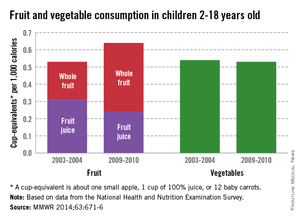Children are consuming more whole fruit and less fruit juice, but their vegetable intake hasn’t changed in the past 7 years, according to a report from the Centers for Disease Control and Prevention (CDC).
From 2003 to 2010, whole fruit intake increased 67% and total fruit intake increased 13% in children aged 2-18 years. Children consumed 0.24 cup-equivalent per 1,000 calories (CEPC) in 2003 and 0.40 CEPC in 2010. Total fruit intake in 2004 was 0.55 CEPC, and 0.62 CEPC in 2010. A CEPC is the equivalent of one small apple, one cup of applesauce, one cup of 100% juice, or 12 baby carrots.
Fruit juice intake decreased 29% from 0.31 CEPC to 0.22 CEPC, the CDC investigators reported. The Healthy People 2020 national goal for fruit intake is 0.9 CEPC (Morb. Mortal. Wkly. Rep. 2014;63:1-6).
Over the same period, vegetable intake was steady at 0.54 CEPC reported in 2003 and 0.53 CEPC in 2010. The vegetable intake national goal is 1.1 CEPC by 2011.
Of all the demographic groups defined in the report, only children aged 2-5 years reached the national goal of 0.9 CEPC for fruit intake. No demographic reached the vegetable intake national goal, the investigators said.
The CDC report was based on data from 12,459 participants, collected for the National Health and Nutrition Examination Survey.


